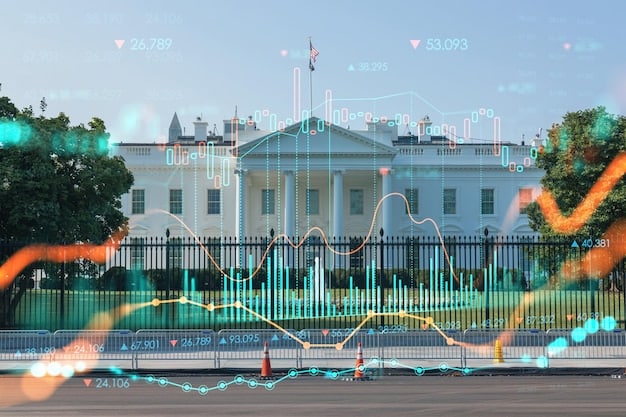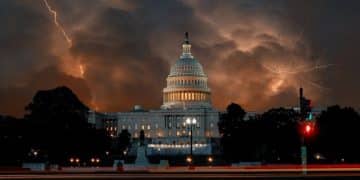Republican Strategies to Combat Inflation: A 6-Month Consumer Impact Analysis

Republican Party strategies for combating inflation in the US primarily involve fiscal responsibility through reduced government spending, tax cuts to stimulate the economy, and deregulation to lower business costs, all aimed at easing the financial burden on consumers within the next six months.
Inflation remains a top concern for Americans, and the Republican Party has proposed several strategies to address it. Understanding what are the Republican Party’s strategies for combating inflation in the US, and how will these strategies affect consumers in the next 6 months? is crucial for navigating the current economic climate.
Republican Fiscal Policies and Inflation Control
The Republican Party generally advocates for fiscal conservatism as a primary tool to combat inflation. This approach centers on reducing government spending and promoting policies intended to stimulate economic growth.
Lowering the national debt and balancing the budget are key tenets of this strategy.
Spending Cuts and Budget Balancing
A core Republican tactic involves advocating for reduced government expenditure across various sectors. This includes scrutinizing federal programs for inefficiencies and areas where spending can be curtailed.
The aim is to decrease the amount of money circulating in the economy, thereby easing inflationary pressures.
- Reduce discretionary spending on non-essential government programs.
- Implement stricter oversight and accountability measures for federal agencies.
- Advocate for a balanced budget amendment to enforce fiscal discipline.

This fiscal discipline is intended to stabilize the economy and foster an environment where inflation is less likely to spiral out of control.
Tax Cuts as an Economic Stimulus
Another key component of Republican strategy is the implementation of tax cuts, primarily aimed at businesses and high-income earners. The theory behind this approach is rooted in supply-side economics.
The idea is that lower taxes will incentivize investment, job creation, and overall economic activity.
How Tax Cuts Affect Inflation
Republicans believe that tax cuts can stimulate economic growth, leading to increased productivity and supply. This increase in supply is intended to balance out demand, preventing prices from rising excessively.
However, critics argue that tax cuts, particularly for the wealthy, can exacerbate income inequality and lead to increased demand without a corresponding increase in supply, possibly fueling inflation.
- Reduce corporate tax rates to encourage business investment.
- Lower individual income tax rates to increase disposable income.
- Offer tax incentives for specific industries or activities to stimulate growth.
The effectiveness of tax cuts in combating inflation is a subject of ongoing debate among economists.
The success of this approach also depends on how businesses and individuals respond to these tax reductions.
Deregulation to Lower Business Costs
Republicans often advocate for deregulation as a means to reduce the costs of doing business. The belief is that fewer regulations can lead to increased efficiency and lower prices for consumers.
This strategy addresses inflation by making it cheaper for businesses to operate and produce goods and services.
Impact of Deregulation on Consumer Prices
By reducing regulatory burdens, businesses can potentially lower their operating costs, which may then be passed on to consumers in the form of lower prices.
However, critics argue that deregulation can lead to environmental damage, worker exploitation, and other negative consequences that outweigh any potential cost savings.

- Streamline environmental regulations to reduce compliance costs for businesses.
- Ease labor market regulations to give employers more flexibility.
- Reduce or eliminate industry-specific regulations that are deemed burdensome.
The types and extent of deregulation must be carefully considered to ensure that any cost savings are not offset by negative externalities.
The focus is on removing barriers to economic activity while still protecting essential public interests.
Monetary Policy and the Federal Reserve
While fiscal policy is directly controlled by Congress and the President, monetary policy, managed by the Federal Reserve (the Fed), also plays a crucial role in managing inflation. Republicans often comment on and sometimes criticize the Fed’s actions.
The Fed primarily uses interest rates and other tools to control the money supply and influence economic activity.
Republican Views on the Federal Reserve
Republicans generally favor a stable and predictable monetary policy. They often advocate for the Fed to focus on price stability and avoid interventions that could distort markets or create asset bubbles.
Some Republicans have called for greater transparency and accountability from the Fed, while others have even suggested reforms to its structure or mandate.
- Advocate for the Fed to maintain a consistent inflation target.
- Support policies that promote transparency and accountability at the Fed.
- Criticize the Fed for actions that are perceived as inflationary or economically harmful.
The relationship between the Republican Party and the Federal Reserve can be complex, with varying degrees of support and criticism depending on the political climate and economic conditions.
The effectiveness of monetary policy in controlling inflation depends on various factors, including the credibility of the Fed and the responsiveness of the economy to changes in interest rates.
The Debt Ceiling and Government Spending
The debt ceiling, which is the legal limit on the total amount of money the US government can borrow, often becomes a point of contention between Republicans and Democrats. Republicans frequently use debt ceiling negotiations as leverage to push for spending cuts.
Raising the debt ceiling is necessary to allow the government to continue paying its existing obligations.
Republican Stance on Debt Ceiling Negotiations
Republicans often insist on significant spending cuts as a condition for raising the debt ceiling. They argue that controlling the national debt is essential for long-term economic stability and preventing future inflation.
These negotiations can lead to political gridlock and even the threat of government shutdowns if an agreement is not reached.
- Demand significant spending cuts in exchange for raising the debt ceiling.
- Advocate for long-term fiscal reforms to control the national debt.
- Use debt ceiling negotiations as an opportunity to push for broader policy changes.
The outcomes of debt ceiling negotiations can have significant implications for government spending, economic growth, and the overall fiscal health of the United States.
The debates surrounding the debt ceiling often reflect fundamental differences in economic philosophy between Republicans and Democrats.
Potential Effects on Consumers in the Next 6 Months
The effectiveness of Republican strategies in combating inflation is a subject of ongoing debate. The actual impact on consumers in the next six months will depend on a variety of factors, including the specific policies implemented, the state of the economy, and the actions of the Federal Reserve.
Consumers should closely monitor these developments and consider how they might affect their personal finances.
Possible Outcomes for Consumers
If Republican strategies are successful in curbing inflation, consumers could see lower prices for goods and services, increased purchasing power, and greater economic stability. However, if these strategies lead to slower economic growth or job losses, consumers could face challenges such as reduced income and increased financial insecurity.
The effects on consumers will likely vary depending on their income level, employment status, and geographic location.
- Monitor economic indicators such as inflation rates, unemployment rates, and GDP growth.
- Pay attention to policy changes related to taxes, spending, and regulation.
- Consult with financial advisors to make informed decisions about savings, investments, and debt management.
The next six months will be a critical period for assessing the impact of these strategies on the economic well-being of American consumers.
Understanding these potential effects is essential for making informed decisions and planning for the future.
| Key Point | Brief Description |
|---|---|
| 💰 Spending Cuts | Reducing government expenditure to decrease money supply and ease inflation. |
| 💸 Tax Cuts | Lowering taxes to stimulate economic growth and increase supply. |
| ⚙️ Deregulation | Reducing regulatory burdens to lower business costs and consumer prices. |
| 🏦 Monetary Policy | Influencing the Federal Reserve to maintain price stability. |
Frequently Asked Questions
▼
The primary strategies include fiscal conservatism through reduced government spending, tax cuts intended to stimulate economic growth, deregulation to lower business costs, and advocating for sound monetary policy by the Federal Reserve.
▼
In the short term, tax cuts may lead to increased disposable income for some consumers, but they could also contribute to increased demand without sufficient supply, potentially exacerbating inflationary pressures.
▼
Deregulation aims to lower business costs by reducing regulatory burdens, which could lead to lower prices for consumers. However, it’s crucial to balance cost savings with environmental and social protections.
▼
Republicans often advocate for the Federal Reserve to maintain a stable and predictable monetary policy focused on price stability. Some Republicans push for greater Fed transparency and accountability to ensure sound monetary decisions.
▼
Potential risks include slower economic growth if spending cuts are too drastic, increased income inequality due to tax cuts favoring higher earners, and environmental concerns if deregulation is not carefully managed.
Conclusion
Understanding the nuances of the Republican Party’s inflation-fighting strategies and their potential impacts on consumers is essential. By focusing on fiscal responsibility, tax incentives, and deregulation, the party aims to alleviate inflationary pressures. However, the actual outcomes will depend on a complex interplay of economic factors and policy decisions, warranting careful observation in the coming months.





